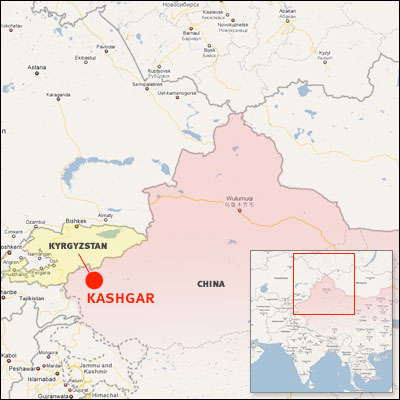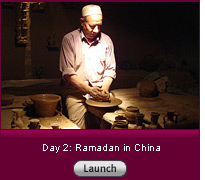Dispatches From China's Wild West
"Have you ever eaten Chinese food?" I asked.
"No," he said. "I never eat food made by nonbelievers—it's unclean." But what if he were to come to America and I invited him over for dinner? Would he eat what I cooked? He changed the subject and took me to Best Food, a Chinese hamburger chain, which, even though it appeared to be staffed exclusively by Chinese workers, was apparently acceptable because it represented Western cultural encroachment into Kashgar. Chinese encroachment, to Ali and most Uighurs here, is an entirely different matter.
Although nominally "autonomous," Xinjiang is anything but. The Chinese government restricts the use of the Uighur language, has closed many mosques and monitors clerics, and gives preferential treatment to the Han Chinese who migrate here in increasing numbers. The situation has only gotten worse since Sept. 11. China has used the specter of Islamist terrorism to crack down on every form of Uighur political activity. (Washington bears some small responsibility for this: To enlist Chinese support in the "war on terror," the State Department put one shadowy Uighur organization on its list of terrorist groups, a fact that China frequently trumpets as it cracks down on Uighurs, terrorists or otherwise.)
A proud Uighur nationalist, "Ali"—not his real name—was in his early 20s. Short and thin, he wore the same black T-shirt, black jeans, and black dress shoes during the three days I spent with him. He spoke Chinese poorly and had taught himself English. He didn't go to university, which he blamed on the Chinese government's racism.
I told him I was surprised to see how developed Kashgar was. "The Uighurs are just keeping these roads and buildings for the Chinese," he replied. "More and more Chinese are coming here, and they have skills we don't. We're getting poorer and poorer, and eventually we're going to end up as their slaves."
As we sat in the plastic booth while I ate my spicy chicken sandwich and fries and Ali watched, I asked whether there was any special TV programming for Ramadan. I knew many Muslim countries rolled out big miniseries for the holiday. "No, it's the opposite here," he said. "I think the government puts on movies with kissing and things like that, especially during Ramadan."
After lunch, Ali and I went to a government-run factory where Uighurs mass-produced their traditional hats, clothes, and musical instruments to sell to tourists. We stopped in the rug showroom, where the friendly Chinese assistants offered us chrysanthemum tea. I had some, but Ali declined. They insisted, and he had to explain that he couldn't drink anything until sundown. Although they lived in a city that was 90 percent Muslim, they didn't know that Ramadan had started.
Next, we headed to the Id Kah mosque, built in 1442, the center of Kashgar life since then. Ali explained that the plaza in front of the mosque used to be crowded with food stalls, flower gardens, and a huge clock tower. All are now gone, victims of government "renovation." Instead, a huge JumboTron screen now shows kung fu and other Chinese movies every night.
We passed through the mosque's yellow-brick archway, into its cool courtyard, thick with shade trees, where small groups of men were chatting quietly. Ali pointed to a glass-enclosed sign addressed to tourists in Chinese, Uighur, and English. "First, you should read this nonsense," he said. By "nonsense," he was referring not to their tortured verbiage (his English was curious enough; for example, he called handicrafts "manual dexterity of the people") but to their aggressively political content.
After a couple of vague sentences about the mosque's early history, the text turned to a lengthy description of the Communist Chinese government's restoration efforts, including its construction, in 1983, of a "modern public bathroom."
"All of it shows fully," the sign continued, "that Chinese government always pays special attentions to the another and historical cultures of the ethnic groups, and that all ethnic groups warmly welcome Part[y]'s religious policy. … All ethnic groups live friendly together here. They cooperate to build a beautiful homeland, support heartily the unity of different ethnic groups and the unity of our country, and oppose the ethnic separatism and illegal religious activities." There were similar rah-rah messages at the 17th-century mausoleum of a Uighur holy man and at Pan Tuo City, a brand-new monument on the outskirts of town that commemorates the Chinese conquest, in the first century, of the territory that would later become Xinjiang.
The politicization of Kashgar's historic sites has been accompanied by a similar commercialization. To tour the most intact neighborhood of traditional Muslim homes—which stood in for 1970s Kabul in the movie The Kite Runner—you must pay a $4 entrance fee. The money goes to a private company owned by a Chinese businessman. Families who live in the neighborhood receive some money in exchange for allowing tourists to roam around their houses, but it's a pittance, one elderly couple complained. "And they don't do anything to improve the neighborhood, either," the woman told me, as we talked in the courtyard of her charming, but crumbling, home. Of course, that would negate the whole purpose. According to the brochure I was handed as I entered, "By visiting the old town, you will feel like you are in the middle ages."
By dinner time, Ali was unable to talk about anything except the exact time the sun would go down. We found a Uighur restaurant, where the large majority of patrons were Han. (However they may feel about Uighurs, Chinese people do love Uighur food.) Ali had several long conversations with the waitress about exactly when it would be time to eat, made three cell phone calls to the same effect, and went outside twice to check on the downward progress of the sun.
At last, the time came, and our waitress brought Ali a bowl of water, which he gulped down. He did the same with another one, and then he asked for a bigger bowl. We'd been walking in the heat all day, and I tallied up the liquid I'd drunk: a supersized Coke at Best Food, a couple of bottles of water, tea at the rug shop, and several other cups along the way. The waitress brought Ali a piece of bread, which he scarfed down, and I noticed several members of the waitstaff discreetly chewing on their own pieces of bread.
After dinner, we went to what was supposed to be a performance of traditional muqam music, but it turned out to be an appallingly minstrelized version of Uighur culture. The show included a song called "Kashgar," lip-synced in Chinese by a Wayne Newton-esque crooner against a painted backdrop of a fantasy Kashgar. The backdrop included the clock tower—demolished five years earlier—and, behind it, a skyline filled with Shanghai-like skyscrapers, presumably a vision of Kashgar's future.
I was surprised that Ali had wanted to take me to the show, since it seemed to be the epitome of all the offenses to his culture he'd been complaining about all day. In all the museums, historic sites, government propaganda, and monuments, Uighurs were always smiling widely, dressed in traditional clothes, and they were often singing or dancing—they were never portrayed as statesmen, scholars, or war heroes. It was pretty easy to read between the lines: Yes, the Uighurs are fun-loving and charming, but they're a bit primitive and certainly not capable of ruling themselves.
Leaving the show, my head spinning, I tried to explain all this to Ali. He paused for a second and said: "But I like to dance."
His failure to take offense at the show confused me, and I kept thinking about it long after I left Xinjiang. A couple of months later, when I returned home, I met Rebiya Kadeer, a Uighur activist and Nobel Peace Prize nominee who now lives in the United States. I told her the story of the muqam show and asked her about Ali's response.
"Uighurs do feel the insult, but they're used to those kinds of insults. Maybe he couldn't find another place where true Uighur songs were sung. Muqam exists only in name now—it's slowly disappearing, and you don't see a lot of singers anymore. So at least in that place you see Uighurs singing songs," she said. "This is a time of confusion for Uighurs. We live in fear, we can't speak what is in our hearts, moral values have changed, and that's why we can't see things clearly. We're not the Uighurs of before."

